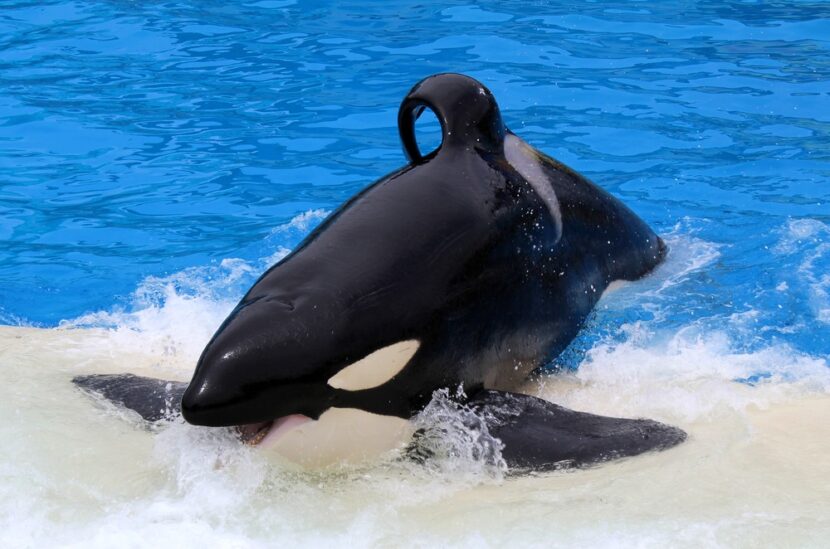MIAMI — Following years of criticism and the death of a trainer, SeaWorld Entertainment said it will no longer breed killer whales. Thursday’s announcement was widely applauded by animal rights groups, but lamented by a trade group for aquariums and theme parks as a hindrance to science and conservation. Some comments:
“SeaWorld’s decision to end captive breeding, and make no additional wild captures in the future, means that the current generation of captive orcas in their parks will be the last.”
– Rep. Adam Schiff, D-California, who authored the Orca Responsibility and Care Advancement Act in 2015.
“This decision means that in 30 or 40 years, after the last of SeaWorld’s orcas have passed away, future generations of American children will no longer be able to see and experience the awe-inspiring physicality and intelligence of these apex predators up close and be inspired to help conserve them in the wild.”
– Kathleen Dezio, president and CEO of the Alliance of Marine Mammal Parks and Aquariums.
“We don’t come to this discussion, or this collaboration with any naivete or any lack of knowledge about the operations of SeaWorld. We didn’t want to be endlessly mired in conflict with SeaWorld. The goal was to make progress for animal rights.”
– Wayne Pacelle, CEO of the Humane Society of the United States, which announced a conservation and education partnership with SeaWorld on Thursday.
“The decision to end its orca breeding program globally and to commit to ending the collection of exhibit animals from the wild, as well as to a ”no orca“ policy should SeaWorld expand its brand into new international markets, is a monumental and importantfirststep forward in achieving a more humane business model for the company.”
– Dr. Naomi Rose, marine mammal specialist at the Washington-based Animal Welfare Institute.
“I’m a mother who used to take her kids to SeaWorld. I just asked a question, and that question was, ‘Why did a top-level
SeaWorld trainer come to be killed by a killer whale?’ Very few people see documentaries anyway — I never imagined there would be a
sea change. I think it struck a nerve … and I think this resonated with children. I call kids these days the ”I-can’t-believe-we-used-to-do-that“ generation. They’re the ones who decide where families go on vacation.”
– Gabriela Cowperthwaite, director of the 2013 documentary “Blackfish.”
“’Blackfish’ is full of lies … I blame CNN for this. They bought the rights and have aired it a number of times. Frankly, sooner or later, if someone tells enough lies about you, people are going to believe those perceptions. It’s a sad day for journalism. It’s a sad day for the zoo and aquarium field and a sad day for the people at SeaWorld who care so much about those animals. because of places like SeaWorld.”
– Grey Stafford, incoming president of the International Marine Trainers’ Association.
“I can envision a day coming soon when children will be repelled by the idea of keeping any wild and sentient animals in captivity. Caging tigers, lions, elephants, orcas and other dolphins, to name a few, will become just as repulsive to an evolved civilization as smoking in restaurants.”
– Louie Psihoyos, director of the 2009 documentary “The Cove,” which showed the killing of dolphins in Japan.
“The Coastal Commission is gratified to have played a role in SeaWorld’s decision to end its breeding program.”
– Noaki Schwartz, spokeswoman for the California Coastal Commission, which banned orca breeding last year.
“Keeping and breeding large, intelligent animals in small underwater cages for the sake of entertainment and profit is simply unethical. Consumers have woken up and sent a clear message to SeaWorld that they won’t pay to watch animal cruelty in action.
– Angus Wong of SumOfUs, an international consumer watchdog organization.
“SeaWorld needs to go all the way and remove them from the stadium and put them into a sanctuary. And I believe the public will follow. If you put them in a natural setting, somewhere really beautiful, the public will go. They won’t make as much money because they won’t do stupid tricks and have a spectacular show, but the public will still support that.”
– Ric O’Barry, trainer of TV’s “Flipper,” founder of the DolphinProject.net and subject of the documentary “The Cove.”
“We’re eager for them to move a little faster toward the next step, which is a sea pen option. It’s difficult, it has to be done on a case by case basis so it’s not simply dumping them in the ocean. We’re not trying to free the whales _ we know they can’t live in the ocean, for the most part, (but) there’s more that they can do.”
– Howard Garrett, founder of the Orca Network, which has pushed Miami Seaquarium to release its orca, Lolita.
“The marine mammal shows at Miami Seaquarium are constantly evolving in order to incorporate important educational and conservational elements. As a result, several months ago the killer whale presentation at Miami Seaquarium transitioned into an educational presentation about killer whales, their natural behaviours and the endangered Southern Resident Killer Whale population.”
– Andrew Hertz, General Manager, Miami Seaquarium.

